The Gender Pay Gap continues to be a huge problem in society. Women, on average, receive lower pay than men. This disparity can be attributed to a range of legal, social, and economic factors. These include issues such as gender based discrimination, the difference in treatment between mothers and fathers in the workplace, parental leave policies, and societal expectations of gender roles.
To gain insight, we spoke with Alexander Betz, a research associate at the Chair of Sociology and Empirical Social Research at the Catholic University Eichstätt-Ingolstadt.

The negative effects of the pay gap extend beyond individual concerns, resulting in lower economic productivity and fewer chances for education and personal growth.
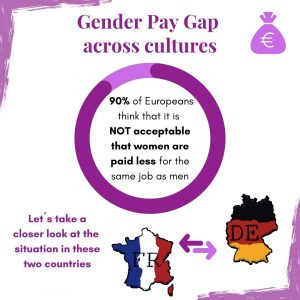
The Gender Pay Gap varies across countries, including neighbouring ones like France and Germany. According to statistics, France has a smaller Gender Pay Gap compared to Germany. The differences in pay are mainly explained by the gender distribution of occupations: women do not occupy the same types of jobs and do not work in the same sectors as men, and have less access to the highest paying jobs. For a comparable job, i.e. the same occupation for the same employer, the full-time adjusted wage gap in France is around 4%.
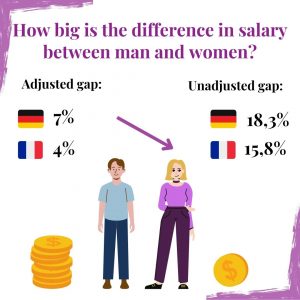
The wage income gap between women and men employees is even more pronounced between parents: mothers work significantly less hours than fathers, but also have lower full-time adjusted wages, and the gap increases with the number of children.
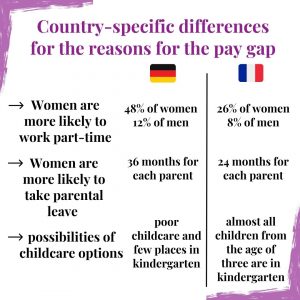
In 2021, in France, the average wage income of women was 24% lower than that of men in the private sector. This pay gap reflects differences in the annual volume of work, as women are less often employed during the year and more often work part-time. But social pressure and societal expectations are important factors as well:
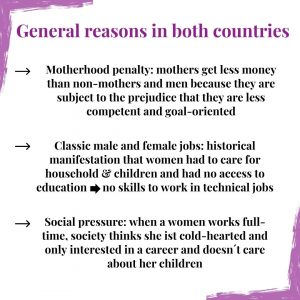
In both countries, different solutions have been suggested so far.
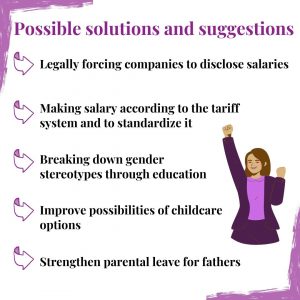
by Isabella Astrauskas, Carolin Eitel, Yara El Germany and Lise Tavelet
Sources:
Bundesministerium für Familie, Senioren, Frauen und Jugend (2021): https://www.entgeltgleichheit-fördern.de/wichtige-daten-und-fakten-rund-um-das thema-entgeltgleichheit/fact-sheet-entgelttransparenz-in-frankreich
Cleiss (2023): https://www.cleiss.fr/docs/regimes/regime_france/al_4.html
European Institute for Gender Equality (2022): https://eige.europa.eu/gender-equality-index/2022
Eurostat (2023): https://ec.europa.eu/eurostat/databrowser/view/teqges01/default/table
Statista (2023): https://de.statista.com/statistik/daten/studie/188794/umfrage/erwerbsquote-in-den-eu-laendern/
Statista (2023): https://de.statista.com/statistik/daten/studie/1098738/umfrage/anteil-der-teilzeitbeschaeftigung-in-den-eu-laendern/
Statistisches Bundesamt (2023): https://www.destatis.de/DE/Themen/Arbeit/Verdienste/Verdienste-GenderPayGap/_inhalt.html
Statistisches Bundesamt (2023): https://www.destatis.de/DE/Themen/Arbeit/Arbeitsmarkt/Qualitaet-Arbeit/Dimension-3/elternzeit.html
__________________________________________________
This article is a product of the project „Futur2 – French German Journalism“ by students of BA Journalism, KU Eichstätt-Ingolstadt and M1 Journalism, CELSA Sorbonne University. It was funded by Deutsch-Französische Hochschule | Université franco-allemande: „Élysée-Vertrag – Zusammen den Blick in die Zukunft richten“ in 2023.


